Showing 1-10 of 40 results
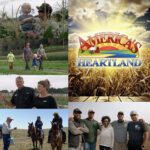
Farming Strategies for Adapting to Extreme Weather
SARE partnered with PBS KVIE to produce an episode of RFD-TV's America's Heartland that highlights how farmers and ranchers across the United States are using sustainable and regenerative practices to adapt to increasingly challenging and unpredictable weather conditions. Adapting to Flooding and Drought on Hurricane Flats Farm in South Royalton, Vermont Ashley Loehr and Antoine […]
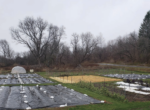
Tarping in the Northeast: A Guide for Small Farms
Reusable tarps, including black plastic (silage tarps), clear plastic and landscape fabric, are multi-functional, accessible tools that are increasingly popular on small farms. The use of opaque materials that block light is frequently called “occultation,” while the use of clear tarps is called “solarization.” The use of the word "tarping” is a general term to […]
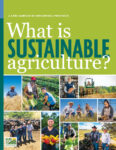
What is Sustainable Agriculture?
This award-winning report provides a sampler of best practices in sustainable agriculture—from marketing and community vitality to cover crops and grazing—as well as eight profiles of producers, educators and researchers who have successfully implemented them.

Leaders in Sustainable Agriculture Featured on America's Heartland
SARE partnered with PBS KVIE to produce an episode of RFD-TV's America's Heartland that features four farmers describing their commitment to sustainability, how they plan to meet farming challenges of today and tomorrow, and how SARE has impacted their farming and ranching practices. The full 24-minute video is available, as is each segment featuring the […]
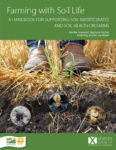
Farming with Soil Life
This handbook, created by The Xerces Society, dives into soil biology. It provides a connection between healthy soils and healthy invertebrates found in temperate agricultural soils. Farming with Soil Life starts with a review of soil basics, including the functions, classifications and properties (physical, biological and chemical) of soil. It provides detailed methods on how […]
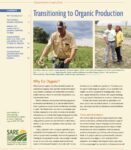
Transitioning to Organic Production
Transitioning to Organic Production lays out many promising conversion strategies, covering typical organic farming production practices, innovative marketing ideas and federal standards for certified organic crop production.

Soil Health Principles and Practices Videos
Experienced farmers and Sustainable Agriculture Research and Education (SARE) provide information on managing and improving soil health. Farmers discuss practices such as cover cropping, and using mulch and compost to improve soil health.
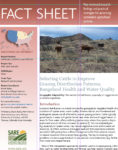
Selecting Cattle to Improve Grazing Distribution Patterns, Rangeland Health and Water Quality
This project is the first and only study that we are aware of that has evaluated whether grazing distribution has the potential to be improved through intensive breed selection. Most of the management approaches currently used to increase grazing uniformity, such as water developments and fencing, can resolve livestock grazing distribution problems on both private and public lands. However, these practices usually require large capital expenditures.
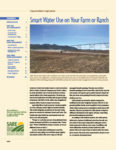
Smart Water Use on Your Farm or Ranch
As producers throughout the nation grow increasingly concerned about water scarcity, farmers, ranchers and agricultural educators are beginning to explore new, conservation-oriented approaches to water use.
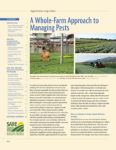
A Whole Farm Approach to Managing Pests
This 16-page bulletin helps producers—and the educators who work with them—use ecological principles across the entire farm to control pests.